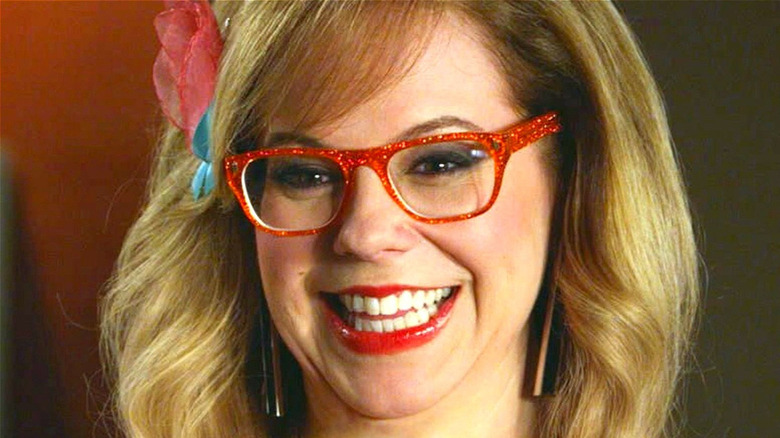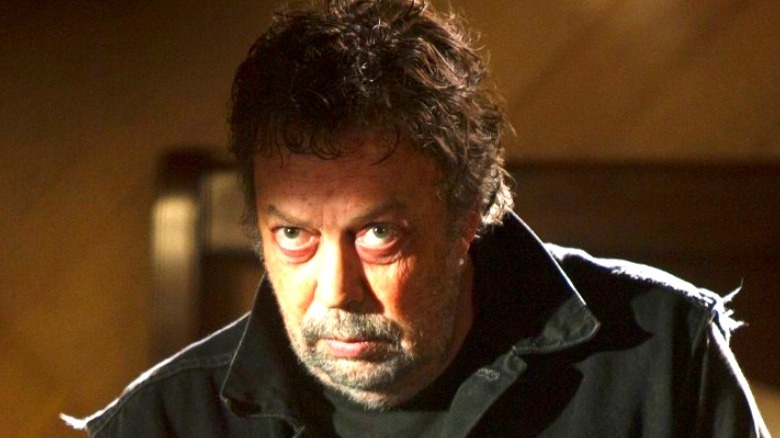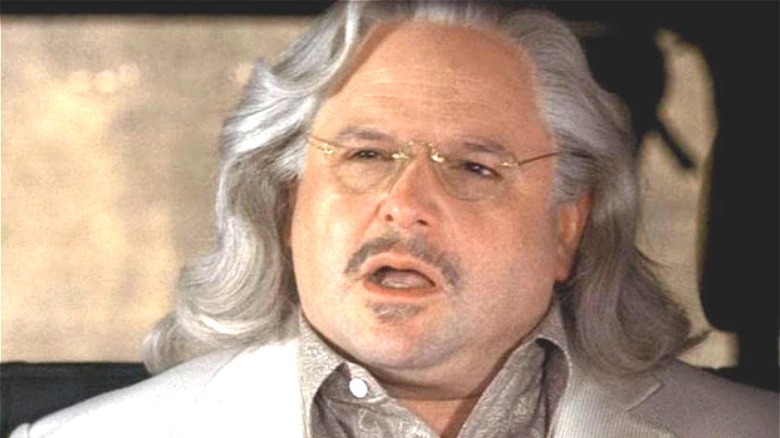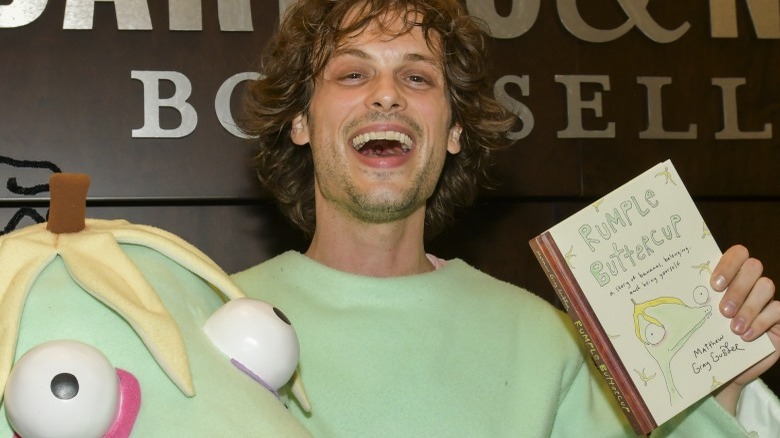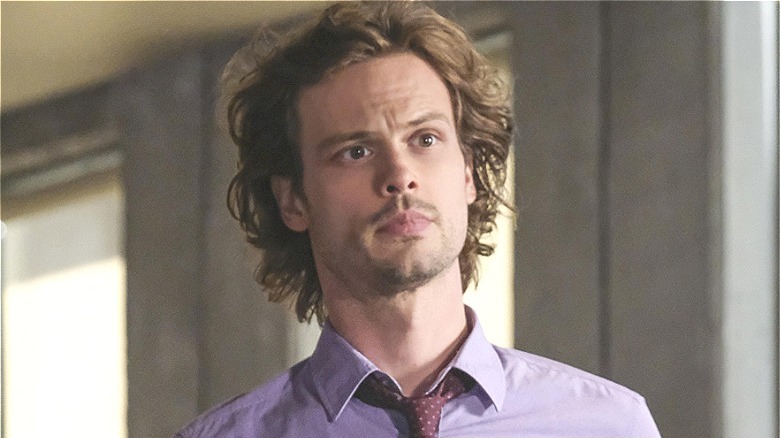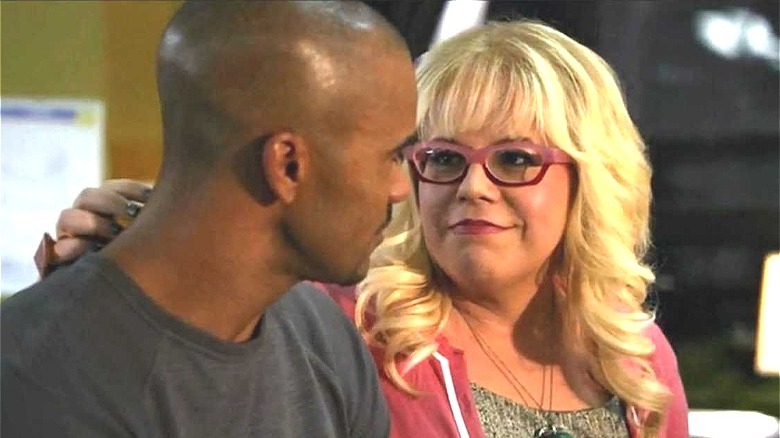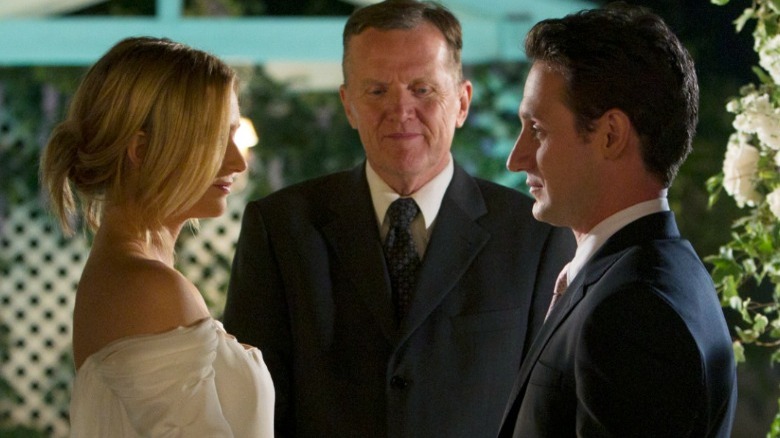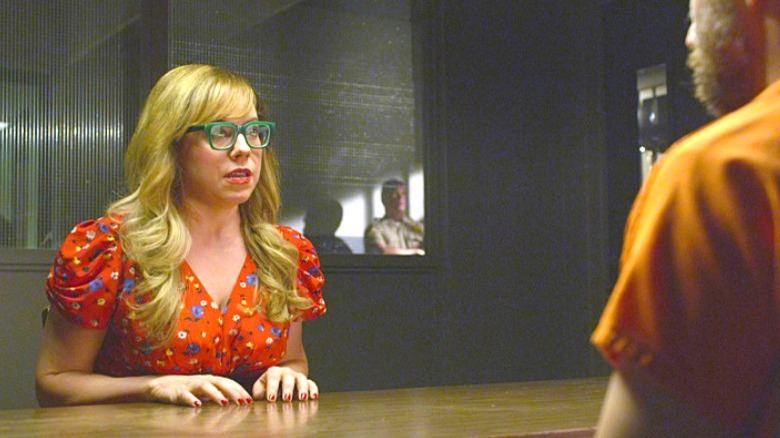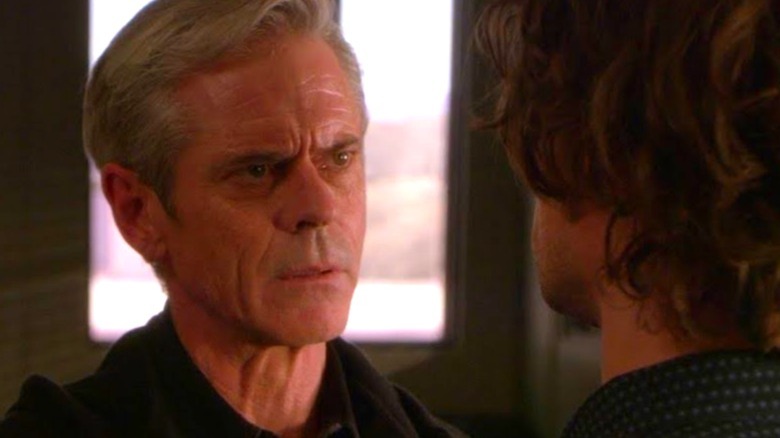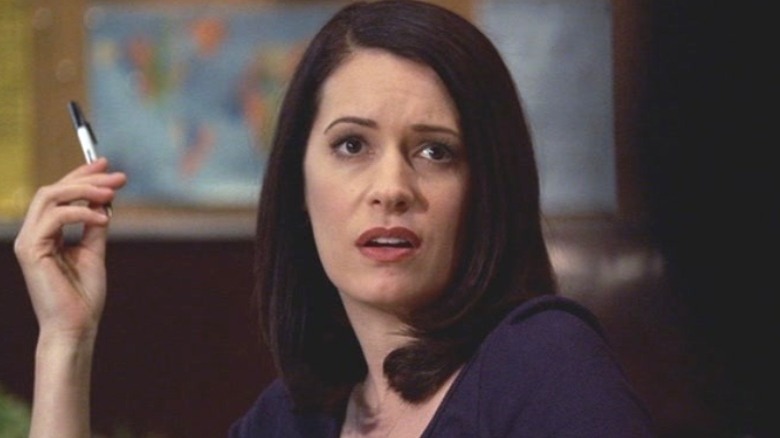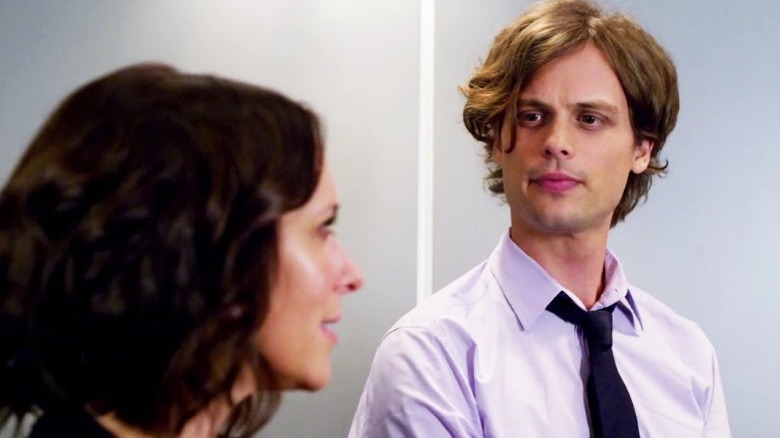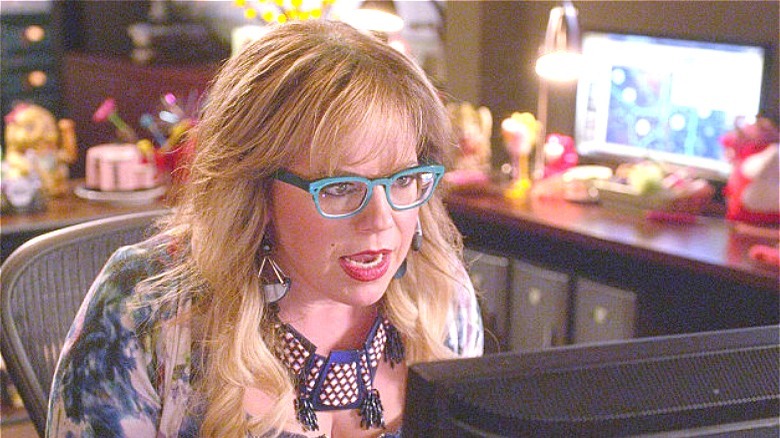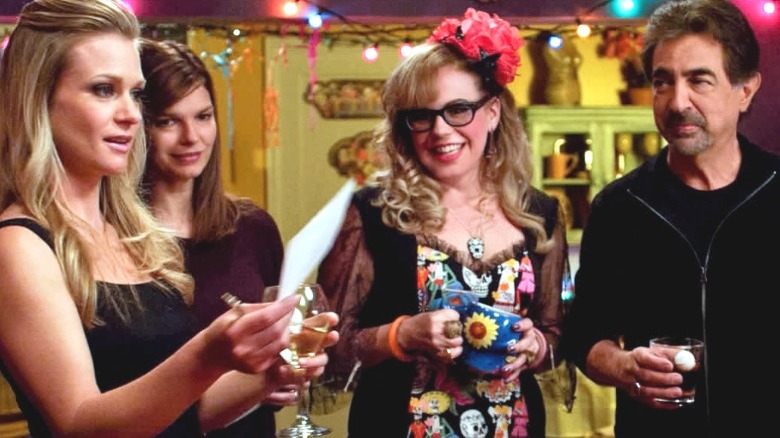The Best And Worst Things About Criminal Minds
In a world replete with crime shows and various other procedurals, it takes a lot to stand out, but "Criminal Minds" is one series that has continued to win over audiences season after season throughout its run. The show follows a fictional FBI Behavioral Analysis Unit as they travel around the country via private government jet investigating serial killers, often with strange or even absurd MOs. With its crack team of special agents, spotty oversight, and apparently unlimited funding, the BAU always seems to get the job done, even if they nearly die in the process from time to time.
During the show's many seasons on the air, the BAU family has found themselves facing off with wound collectors, family annihilators, serial bombers, workplace shooters, and thrill killers, getting tangled up in cases personally far more frequently than any real-life logic would allow for — but one of the great things about this primetime crime drama is that it isn't real, so it doesn't have to make sense. From great characters to questionable writing decisions, let's check out the best and worst things in "Criminal Minds."
Best: All the great guest stars
"Criminal Minds" has featured hundreds of unknown/unidentified subjects (known as unsubs) along with dozens of fantastic guest stars. The show has played host to plenty of big-name actors, some of whom were serious regulars like Jennifer Love Hewitt (as Kate Callahan), Mandy Patinkin (as Jason Gideon), and Aisha Tyler (as Tara Lewis), who spent time working on the BAU team, and the incomparable Jane Lynch, who played Spencer's mom Diana Reid, whose struggle with schizophrenia is a key point of character development for her son.
Fans rewatching the series will also catch plenty of actors who got their unsub on early in their careers, including a very guylinered Aaron Paul ("The Popular Kids", Season 1, Episode 10) and Evan Peters before his "American Horror Story" days. Cinema legends Tim Curry and Mark Hamill both popped up on the series as unsubs so epic they warranted serial killer nicknames. As prolific serial killer Billy Flynn, Curry's character was dubbed "The Prince of Darkness," a fitting name for a character played by the Lord of Darkness from the 1985 Tom Cruise fantasy "Legend." Mark Hamill also played a serial killer as "The Replicator" John Curtis, the ultimate copycat with an impressive CV and a penchant for using the word "Zugzwang." Elle Fanning, Luke Perry, Ed Asner, and Aubrey Plaza are just a few of the other big-name guest stars who have appeared on the series.
Worst: When Jason Alexander guest starred
It's a lot of fun, and often a nice surprise, to see outstanding dramatic work from actors known for their comedic roles. Bryan Cranston's outstanding performance as the notorious Heisenberg of "Breaking Bad" came as a surprise for many who only knew him from "Malcolm in the Middle," and Jim Carrey's performances in "The Truman Show" and "Eternal Sunshine of the Spotless Mind" were soulful and nuanced. But when an actor ends up being a bad fit for the dramatic format, the result can be funny for the wrong reasons — and that's exactly what happened when Jason Alexander played the pretentious Spencer fan Henry Grace in the Season 4 episode "Mastermind."
After bombing to a lecture hall full of university students, Spencer (Matthew Gray Gubler) and Rossi (Joe Mantegna) are approached by Grace, who is rocking long, luscious silvery locks and a white linen suit with a personality of its own. After a brief joke about existentialists changing a light bulb, the wigged wonder begins bragging about what a super smart serial killer he is, and with a flick of his wrist that sends oddly artistic camera stills of his victims flying, Alexander's hammy performance is in full swing. Few guest stars have garnered more Reddit buzz than Alexander. Redditor u/d7856852 described the episode as "a fever dream," with u/wyatt_slurp musing that his character "acted just like George trying to impress a smart woman" and u/TheNoblePlatypus17 observing, "The real unsub in this episode was that wig." One subReddit even had "Seinfeld" fans theorizing that the "Criminal Minds" episode was actually an alternate reality George Costanza.
Best: Spencer Reid in general
The BAU is brimming with interesting profilers, from the hunky Morgan to the manic pixie dream tech Garcia. But one of the consistent bright spots in the series is without a doubt the village brainiac, Dr. Spencer Reid. With his messy-in-all-the-right-ways sandy hair and his T.A. fashion aesthetic down to the unmatched socks and vest, Reid is downright adorable. The ultimate bookworm, Reid understands that Google never has and never will be an adequate substitute for the feel, smell, and experience of good old-fashioned hardback-and-paper books. Between his love for learning and his eidetic memory, Spencer is basically a living encyclopedia, and no matter the occasion, he's got a compendium of piping hot facts ready to go when they're needed.
In real life, actor Matthew Gray Gubler is as quirky and charming as his BAU counterpart, if not more so. He authored a children's book called "Rumple Buttercup" about a green monster with a banana peel hat, and he lives in a whimsical "haunted treehouse" that he toured for a Vanity Fair video where he talks about his side gig as a puppet artist.
Worst: Spencer is a punching bag for the writers
Every main character on "Criminal Minds" is forced to endure their share of abuse in their time at the BAU, but tormenting one character in particular seems to be a favorite pastime for the show's writing team. With his mom's schizophrenia, abandonment by his dad, and a history of childhood bullying, Spencer Reid has had a tough time of it from the beginning, which is probably why he has such a strong capacity for empathy. During his life as a profiler, Reid has been kidnapped, shot on three separate occasions (neck, arm, and knee), forcibly injected with drugs that he later battles an addiction to, nearly dies from an overdose, gets a possible anthrax exposure, is forced to watch his girlfriend die, gets framed for murder and tossed in a maximum security Mexican prison, is held hostage, gets trapped by a religious cult, is tortured and has that torture livestreamed, and (understandably) suffers from debilitating PTSD and migraines. While it's true that Hotch, JJ, Morgan, and Garcia all have to endure their share of trials and personal tragedies, Reid is the only one among the lot who never has anything close to a family or healthy, normal long-term relationship. And who wouldn't love to see a mini-Reid running around the BAU dinner parties?
Best: Garcia and Morgan's friendship
Scully and Mulder. Sam and Diane. Kate and Jack. Kate and Sawyer. Audiences have always loved a good 'ship, which is probably why writers can't help but push their male and female leads into romantic territory despite the fact that platonic relationships can be incredibly fulfilling and often make a lot more sense to the story. And let's face it — the world of television is woefully short on representations of healthy, supportive non-romantic relationships between men and women. That's one of the reasons that the relationship between Penelope Garcia (Kirsten Vangsness) and Derek Morgan (Shemar Moore) is one of the best things about "Criminal Minds." Although the BAU has plenty of positive examples of male-female relationships, Garcia and Morgan seem to understand each other like no one else in the bureau. Through witty banter and flirty quips, the pair become fast friends, and their interactions often bring levity to otherwise incredibly bleak situations even if they also occasionally veer into "human resources violation" territory.
Worst: JJ's marriage
With the horrific murder of Agent Hotchner's wife and the devastating loss of Reid's girlfriend Maeve, it would seem like the long-term marriage of a BAU profiler would be a welcome change. But JJ's marriage to Cajun cop Will LaMontagne (Josh Stewart) is lackluster at best and annoying at worst — to the point that you'd be forgiven for forgetting Jareau was married over and over only to be surprised every time Will or the kids are mentioned despite the fact that their marriage lasts for most of the show's run.
JJ (AJ Cook) and Will first meet during Season 2 while working on a cold case his dad started. When he resurfaces in Season 3 and it's clear that they have been long-distance dating, their relationship has all the chemistry of tepid tap water. After a dreamy wedding straight out of the same Instagram realm where cursive wall art grows old and dies, they quickly settle into a sleep-deprived married-with-kids routine. Although they do seem to have a fairly functional and mutually supportive union, their relationship has never really had any sparkle, and many fans of "Criminal Minds" find both Will and the marriage pretty bland. As Redditor u/Deep_Worldliness4783 put it, Will is "a good husband and father yes, but a bad match" for Agent Jareau. On the other hand, with all the chaos the profilers have to live with, wanting a plain vanilla home life is possibly the most understandable part of the series.
Best: The absurdity
One of the things that makes "Criminal Minds" such a blessedly fun show to watch is that despite heavy topics and ripped-from-the-headlines stories, the writers don't take themselves too seriously. Penelope Garcia serves as a Post-it note reminding viewers that this isn't a fictionalization of "Dateline" and should not be taken as such. Her character shines with her colorful personality and whimsical take on the job, and her office looks like a claw machine exploded. Spencer's memory and superhuman reading speed also borders on the absurd. Besides constantly spouting off statistics and Jeopardy-worthy factoids, he even knows details about the other agents, as when he quickly offers up Prentiss' birth date down to the time of day as Garcia is reading horoscopes from the paper in the Season 4 episode "Cold Comfort." From bizarrely creative — and organized — serial killers to the posh private jet the agents have at their disposal, the show's sillier moments help to lighten up what would otherwise be awfully grim storytelling.
Worst: The depravity
The FBI Behavioral Analysis Unit in "Criminal Minds" deals primarily with violent crimes where understanding the psychology of the suspect is crucial to the investigation. Most of those cases relate to dangerously violent criminals, serial killers, and sex offenders, and the vast majority are incredibly dark. Easily one of the most disturbing crime shows to air on primetime television, the series frequently includes fairly graphic depictions and/or descriptions of murders, sex crimes, and body horror — so much so that it proved too dark for Mandy Patinkin, who played Jason Gideon on the series. After leaving the series, Patinkin told The Hollywood Reporter that he hadn't fully understood what he was getting into when he was first cast, lamenting that he "never thought they were going to kill and rape all these women every night, every day, week after week, year after year" and found the content "very destructive to my soul and my personality." More than a few Reddit threads have been dedicated to the show's capacity for nightmare fuel. As one anonymous Redditor noted, "I get super paranoid if I watch it too often. Sometimes I'll come home late and if a car follows me down my street I'll go around the neighborhood until no one is following me."
Best: The strong women
"Criminal Minds" is hardly the only procedural series with a solid ensemble cast, but part of what makes this series exceptional in its treatment of women is how well-developed the female characters are and how positive and affirming their relationships are with other members of the team, especially other women. Each female member of the BAU is strong in her own way, bringing her own brand of powerful femininity to the Bureau. Prentiss is a gun-wielding powerhouse with a sharp analytical mind, JJ is compassionate and committed to personal and professional development, and Garcia is brilliantly tech-savvy and emanates joy and brightness. The show passes the Bechdel test with flying colors, and its female protagonists are never competitive or antagonistic with other women. Overall, the complex and nuanced depictions of women without overly focusing on their relationships with men is a refreshing change from the typical crime show fare.
Worst: The sexism and homophobia
Any show that was on the air for more than a decade or so in the early 21st century is likely to have some problematic moments, and "Criminal Minds" is certainly no exception. Despite the show's strong female characters, the writers aren't perfect, and the show has been criticized extensively for its treatment of women. Olivia Woods explores some of the problems with the show's treatment of women in Minerva, emphasizing the writers' tendency to prioritize male characters while "letting the female characters fall by the wayside and treating them like background or type characters that are easily replaceable."
Problematic treatment of LGBTQ issues is also an issue in some of the earlier seasons. In the Season 3 episode "Elephant's Memory," Morgan makes a homophobic quip to Reid after he shows up late to a meeting. It's also worth noting that one of the show's seven main characters openly identifies as LGBTQ. In an understandably now-deleted tweet, "Criminal Minds" creator Jeff Davis, who is gay himself, claimed that Spencer was originally bisexual before network execs demanded a change. Many fans of the series have noted on Reddit that Prentiss seems to be queer-coded, and Paget Brewster noted in a Criminal Minds Fan Site interview that she and former showrunner Ed Bernero had discussed writing Prentiss as gay, commenting, "I would be happy to play Emily as bisexual or gay because I trust our team would do it well and honorably."
Best: Garcia's magical database
Plenty of wacky and improbable things happen in the world of "Criminal Minds," and one of the most spectacular is the team's ability to get their hands on piping hot information at the drop of a hat thanks to Penelope Garcia's wondrous computer hacking skills. Garcia's gifts offer a crash course in the Magical Computer trope: With only a few clicks of her keyboard, the sparkly computer tech can cross-check details like how many people in a certain radius are allergic to mushrooms and also took an obscure poetry class in college. The first time her eventual boyfriend Kevin takes a crack at Garcia's computer in Season 3 ("Penelope"), he's taken aback, exclaiming, "This system is insane. It's completely LINUX-based, open-source programming ... her GUI is mind-blowing!" Meanwhile, an unimpressed Hotchner stands by, demanding a list of everyone in the area who failed their bar or got fired from a law firm within the past five years with the initials JCB.
Worst: The Olive Garden commercial energy
Having a team you can count on is important no matter where you work, whether you're flipping burgers or putting the first woman on the moon. And it certainly seems like it would help to bond with one's coworkers when dealing with the grim work of nabbing serial rapists and killers. The BAU team are far more than just a group of close coworkers, developing a familial bond over the years both at work and in their free time. They love celebrating special days together — getting together for Reid's 30th birthday, JJ's intimate wedding, and Garcia's Dia de los Muertos fiesta. And then there are David Rossi's Italian dinner parties, complete with a few bottles of quality wine.
While it's great to see the team getting together, the phrase "family" gets thrown around quite a bit, and the sentiment can feel a bit sappy and overplayed at times, not unlike an Olive Garden commercial. In the subReddit r/criminal minds, Reddit user u/Elegant-Row8181 complained, "around s7, that's when it felt like the whole 'family' narrative was being shoved down our throats." In the same thread, other fans noted that the writers seemed to be overemphasizing parties and "family talk" rather than showing the family relationship through more nuanced writing. As u/the_scientist52 observed, "The later seasons tried to push the "family" narrative but those subtleties weren't there anymore."
